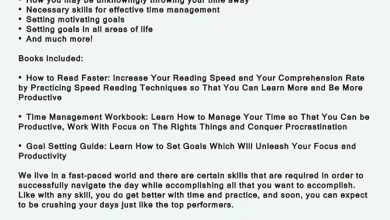How To Be Self-Disciplined With ADHD? Tips and Techniques

ADHD, or Attention Deficit Hyperactivity Disorder, can make staying focused, organized, and motivated difficult. People with ADHD often struggle with self-discipline, impacting their ability to reach their goals and succeed.
However, having ADHD does not mean that self-discipline is impossible. With the right strategies and mindset, it is possible to develop self-discipline and achieve your goals, even with ADHD. So, how to be self-disciplined with ADHD?
To be self-disciplined with ADHD, you’ll need to create rules and routines, break down tasks into smaller manageable chunks, set realistic goals and reward yourself for meeting them, and practice self-care to stay focused and motivated.
For your convenience, we will share some effective ways to improve self-discipline and manage ADHD symptoms. Whether you’re a student, professional, or simply looking to improve your overall productivity, this guide is for you.
How Does ADHD Affect Self-Discipline?
Children and adults with ADHD often struggle with self-discipline, which can negatively affect various areas of life. Here, we will explore how ADHD affects self-discipline.
- Lack of Discipline: People with ADHD often struggle with self-discipline, making sticking to routines and schedules challenging.
- Disruptive Behavior: ADHD can lead to negative behaviors such as interrupting others, talking excessively, and being easily distracted.
- Hyperactivity: Hyperactivity associated with ADHD can lead to restlessness, making it hard to sit still for long periods and causing difficulty in completing tasks.
- Impulse Control: People with ADHD may find it challenging to resist impulses and stay focused on tasks or goals.
Can People With ADHD Develop Self Discipline?
Yes, people with ADHD can develop self-discipline. While ADHD may present challenges regarding self-control and impulse management, some approaches and strategies can be used to build positive behaviors and life skills.
One of the keys to developing self-discipline with ADHD is setting achievable goals and breaking tasks down into smaller, manageable steps. Time limits and routines can also be helpful, as can behavior modification and management plans developed with a psychologist or other professional.
Is Self-Discipline Hard With ADHD?
Yes, self-discipline can be hard for individuals with ADHD. However, it’s important to note that ADHD affects each person differently, and some individuals may have an easier time with self-discipline than others.
That being said, ADHD can make it challenging to complete tasks and achieve goals due to difficulties with impulse control, hyperactivity, and inattention.
Despite these challenges, there are many positive approaches that individuals with ADHD can take to develop self-discipline and improve their lives.
These may include working with a psychologist or behavior specialist, developing behavior management plans, using behavior modification techniques, and using parenting strategies (for parents of children with ADHD).
How To Be Self-Disciplined With ADHD?
Living with ADHD can be challenging, especially when it comes to self-discipline. However, it is possible to overcome this challenge with positive approaches focusing on behavior management plans and developing life skills. Here are some helpful tips and strategies for achieving self-discipline with ADHD.
1. Set Goals and Make a Plan
Setting goals and creating a plan is essential for self-discipline. Identify what you want to achieve and break it down into manageable tasks. Make a plan for accomplishing these tasks and set time limits for each.
2. Develop Positive Behaviors
Developing positive behaviors is a key component of self-discipline. Focus on developing habits that are productive and beneficial to your life. Avoid attention-seeking or addictive behaviors that can lead to negative outcomes.
3. Use Behavior Modification Techniques
Behavior modification techniques can help you overcome negative behaviors and establish positive ones. These techniques include positive reinforcement, where you reward yourself for achieving a goal, and negative reinforcement, where you remove a negative stimulus to encourage good behavior.
4. Seek Support From a Psychologist
A psychologist can help you develop self-discipline strategies tailored to your needs. They can also help you address any underlying psychological issues that may be contributing to your lack of discipline.
5. Practice Impulse Control
Impulse control is crucial for self-discipline. Practice techniques such as deep breathing, meditation, or mindfulness to help you manage impulsive behaviors.
6. Use Parenting Strategies
If you parent a child with ADHD, you can use parenting strategies to help your child develop self-discipline. These include setting clear rules and consequences, positive reinforcement, and a structured routine.
7. Focus on Life Skills
Developing life skills such as time management, organization, and prioritization can help you achieve self-discipline. These skills can also improve your overall quality of life.
8. Take Positive Actions
Taking positive actions is crucial for self-discipline. Focus on taking small, consistent steps toward your goals, even if they are just for a few minutes each day. This will help you build momentum and achieve long-term success.
Why Is Self-Discipline Important For Individuals With ADHD?
Individuals with ADHD have difficulty with impulse control, making self-discipline an essential skill to develop. In this response, we will discuss the importance of self-discipline for individuals with ADHD and its positive effects on their behavior, tasks, and life.
Behavior Management
Individuals with ADHD often struggle with negative behaviors, such as impulsivity and hyperactivity. Behavior management plans and behavior modification approaches can be helpful, but they often require self-discipline on the part of the individual.
Task Completion
Individuals with ADHD often struggle with completing tasks due to distractibility and lack of focus. By developing self-discipline, they can improve their ability to stay on task and complete their work. Time limits and parenting strategies can help promote self-discipline. For example, setting a timer for 15-20 minutes of focused work followed by a 5-6 minute break can help individuals with ADHD stay on task.
Life Skills
Self-discipline is an essential life skill that can benefit individuals with ADHD in many areas of life. Developing self-discipline can improve their ability to set and achieve goals. They can also better control their impulsive behavior and make more thoughtful decisions. These skills can lead to greater success in academics, career, and personal relationships.
Positive Psychology
Self-discipline is a key component of positive psychology. By developing self-discipline, individuals with ADHD can improve their ability to take actions that align with their values and goals. This can lead to greater control over their lives and a sense of accomplishment.
Read Also: How To Develop Patience And Self Control? 9 Effective Ways!
Common Challenges Faced By Individuals With ADHD In Developing Self-Discipline
Individuals with ADHD often struggle with developing self-discipline, which can affect their behavior, tasks, and goals in life. Here are some common challenges faced by individuals with ADHD in developing self-discipline:
- Lack of Discipline: One of the most common challenges faced by individuals with ADHD is a lack of discipline. They may struggle with setting goals and following through with tasks, leading to procrastination and poor time management.
- Impulse Control: Individuals with ADHD often struggle with impulse control, making it difficult to resist immediate gratification and prioritize long-term goals. This can lead to poor decision-making and difficulty in following rules.
- Hyperactivity: Hyperactivity is a common symptom of ADHD that can make it challenging to sit still and focus on tasks. This can lead to poor productivity and difficulty completing tasks on time.
- Disruptive Behavior: Individuals with ADHD may exhibit disruptive behavior, such as interrupting others, talking excessively, and engaging in inappropriate behavior. This can lead to social difficulties and strained relationships.
- Negative Behaviors: People with ADHD may exhibit negative behaviors, such as impulsivity, irritability, and aggression. These behaviors can lead to conflicts with others and difficulty in managing emotions.
Wrapping Up
Self-discipline is an essential skill for individuals with ADHD to be successful in their goals. After reading the guide above, you may understand how to be self-disciplined with ADHD.
Through daily practice, utilization of tools and techniques, and self-advocacy, individuals with ADHD can develop and maintain self-discipline.
With a combination of self-awareness, goal setting, and resilience, individuals with ADHD can be successful in their goals and develop a sense of self-discipline.
Read More:
What Are The 7 Critical Thinking Skills And How To Develop?
How Do Emotions Positively And Negatively Influence Critical Thinking?



